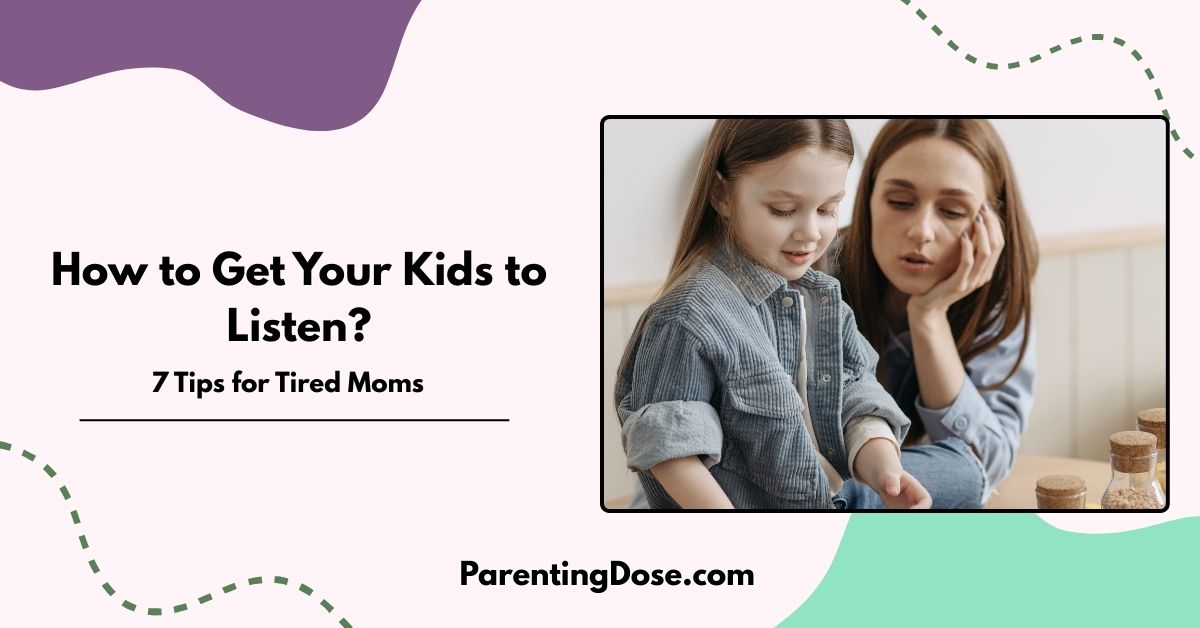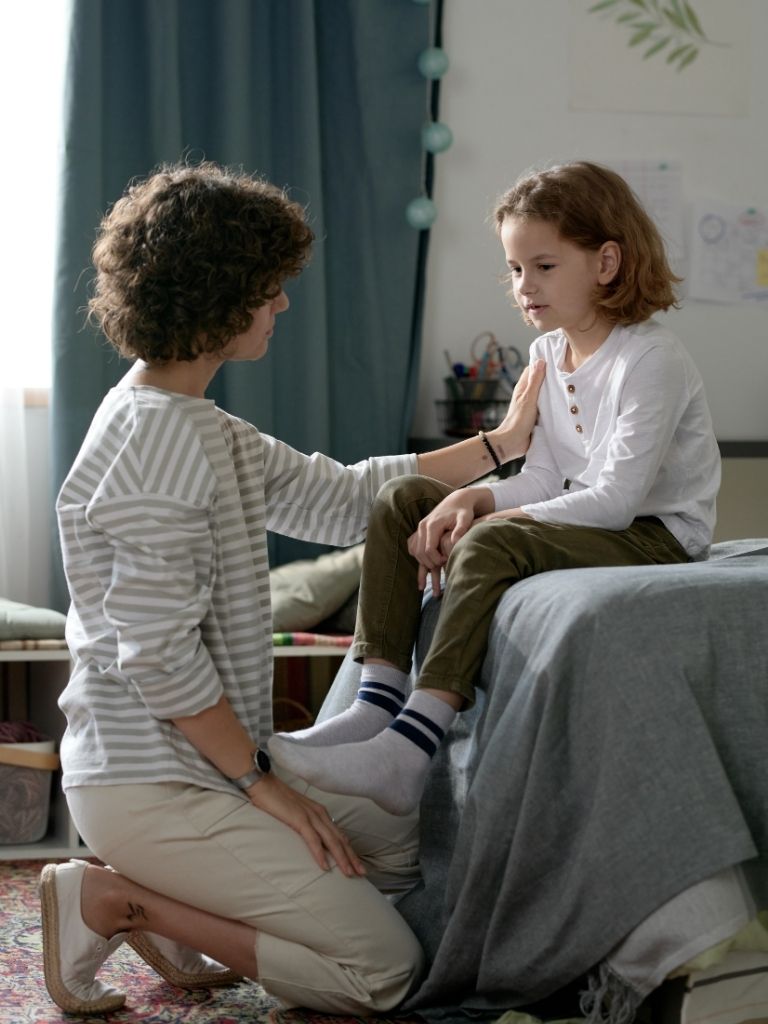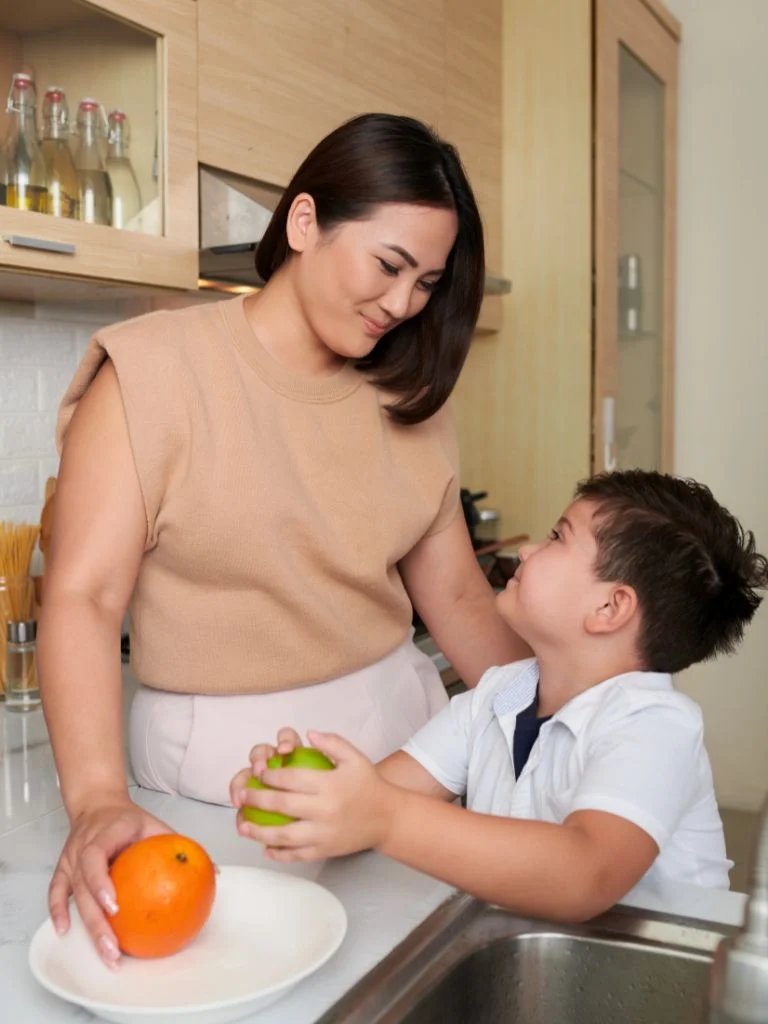I remember the day my toddler decided “no” was her favorite word. She was two, and suddenly, everything was a battle. “Time to brush your teeth.” No. “Let’s put on your shoes.” No. “Please stop pulling the cat’s tail.” No, no, no.
Meanwhile, my preschooler thought running away from me in the grocery store was a fun game. I’d call his name, and he’d giggle and dart behind the cereal boxes. I felt like I was losing my mind, wondering if I was the only mom who couldn’t get her kids to listen.
If you’re here, chances are you’ve hit that wall—repeating yourself for the tenth time, your voice rising, patience gone. We’ve all felt it, whether it’s with a defiant toddler, a questioning preschooler, or a teen who thinks you’re totally uncool.
This isn’t about perfect parenting or magically obedient kids (we know that’s not real). It’s about understanding why they’re not listening and using simple, loving strategies that actually work in real, messy mom life. I’ve been through the tantrums, chaos, and teen eye rolls—and these are the things that helped.
Why Don’t Kids Listen? (And Why It’s Not Your Fault)
Before we get to the how, let’s talk about the why. It’s so easy to feel like your kids are deliberately ignoring you—like they’ve formed a secret pact to test your sanity.
But the truth is, they’re not trying to drive you crazy (even if it feels that way sometimes!).
Their little (or not-so-little) brains are still figuring things out, and that affects how they hear and respond to you.
Here’s what’s really going on, depending on their age:
- Toddlers (ages 1-3): Their brains are still developing the ability to process and follow instructions. They’re also testing boundaries as they discover their independence. That “no” you keep hearing? It’s their way of saying, “I’m my own person!” Exhausting, but normal.
- Preschoolers (ages 3-5): They’re curious, distractible, and starting to assert their own opinions. They might not listen because they’re too busy exploring—or because they’ve decided their idea is better than yours.
- Teens (ages 13+): They’re navigating big emotions, social pressures, and a need for independence. Sometimes, not listening is their way of pushing back or figuring out who they are apart from you.
Understanding this doesn’t magically make the frustration disappear, but it does help you approach it with more empathy—and less guilt.
1. Create a Listening-Friendly Environment
Kids are more likely to listen when they feel calm, focused, and connected. But let’s be honest—our homes aren’t always calm (understatement of the year, right?).
Here’s what works:
- Minimize distractions: Turn off the TV, put away toys, or step into a quieter room when you need their attention. It’s hard for a toddler to hear you over Paw Patrol, and teens won’t listen if they’re scrolling TikTok.
- Use a calm, firm tone: Yelling might get their attention for a second, but it also teaches them that shouting is how we communicate. Speak clearly and calmly—even if you’re faking it ‘til you make it.
- Give them your full attention: When they’re talking, stop what you’re doing and listen. It shows them that listening goes both ways.
2. Get Down to Their Level
One of the easiest ways to get your kid’s attention is to meet them where they are—literally.
This means crouching down to their eye level. It’s hard for a little one to tune you out when you’re right there, looking at them with love (and maybe a touch of exasperation). With teens, it’s more about sitting together, distraction-free—no phones, no TV—just you and them.
One day, I was trying to get my preschooler to put on his shoes, and he was completely ignoring me. I was about to lose it when I remembered this trick.
I knelt down, looked him in the eye, and said, “Hey, buddy, I need your help. Can you show me how fast you can put on your shoes?” Suddenly, he was all in. It wasn’t magic—it was connection. Try it next time your toddler’s tuning you out or your teen’s giving you the silent treatment.
3. Use Positive Reinforcement (aka, Catch Them Being Good)
Kids crave attention, and they’ll take it however they can get it—even if it’s negative. That’s why praising them when they do listen is so powerful.
It’s a cornerstone of positive parenting, and it reinforces the behavior you want to see more of.
- Be specific: Instead of just saying “good job,” try “I love how you listened the first time I asked you to pick up your toys.” It tells them exactly what they did right.
- Make it immediate: Praise them right after they listen, so they connect the behavior with the reward.
- Use small rewards: For younger kids, a sticker or a high-five can work wonders. For teens, a simple “Thanks for helping out” goes a long way.
It’s not about bribing—it’s about showing them that listening feels good. And bonus: it makes you feel good too, because you’re not just nagging all day.
4. Set Clear Expectations (and Gentle Consequences)
Kids need to know what’s expected of them—and what happens if they don’t follow through. You don’t need a complicated rule book—just a little clarity and consistency.
- For toddlers: Use short, clear instructions. Instead of “Clean up your room,” try “Put your blocks in the box.” If they don’t listen, gently guide their hands to do it.
- For preschoolers: Give them a choice. “Do you want to put on your shoes now or after we read a book?” It makes them feel in control while still getting the job done.
- For teens: Have open conversations about expectations. “I need you to text me when you’re going to be late.” If they don’t, follow through with a consequence—like losing car privileges for a day.
The trick is to stay consistent. If you say there’s a consequence, mean it. But also, pick your battles. Not every moment needs to be a showdown.
I learned this the hard way when I tried to enforce a “no snacks before dinner” rule during a toddler meltdown. Sometimes, grace is the better choice.
5. Practice Active Listening (Yes, You Too)
Kids learn by watching us. If they see us really listening—to them, to our partners, to the world—they’ll start to mirror that behavior.
- Put down your phone: When your child’s talking, give them your full attention. It shows them that what they say matters.
- Reflect back what they say: “So, you’re upset because your friend didn’t share the toy?” It helps them feel heard and teaches them how to listen to others.
- Ask open-ended questions: Instead of “Did you have a good day?” try “What was the best part of your day?” It encourages them to share more—and listen when you respond.
I started doing this with my teen, and it transformed our relationship. Instead of the usual grunts and eye rolls, we started having real conversations. It wasn’t overnight, but it was worth the effort.
Even my toddler picked up on it—she’ll mimic me now, nodding and saying, “Oh, I see!” when I talk to her. It’s adorable and a little terrifying.
6. Stay Calm and Consistent (Even When You Want to Scream)
Staying calm when your kids aren’t listening is hard. Like, really hard. But losing your cool usually makes things worse. Kids feed off our energy, so if we’re frantic, they get frantic too. And if we’re inconsistent, they don’t know what to expect.
Here’s what helps me stay grounded:
- Take a deep breath: Before you react, pause. It gives you a second to choose your response instead of just yelling.
- Use a mantra: I tell myself, “This is a phase. It will pass.” It reminds me that these moments aren’t forever.
- Laugh when you can: Sometimes, the absurdity of parenting is just funny. Like when your toddler decides to draw on the walls with your lipstick. (True story.)
If you’re calm and steady, your kids start to feel more secure—and more likely to listen. It’s not about being perfect; it’s about showing up, day after day, with love and patience.
7. Use Humor and Playfulness
Sometimes, the best way to break through is with a laugh.
For toddlers and preschoolers, try a silly voice or turn listening into a game: “Can you hop to the table like a bunny?” Teens might roll their eyes, but a playful “Bet you can’t get this done before I finish my coffee” can lighten the mood.
My preschooler once refused to pick up his blocks. I grabbed a toy robot voice—“Robot Mom commands cleanup!”—and he giggled his way through it. It’s not a fix-all, but it helps when tensions run high.
Conclusion: You’re Doing Better Than You Think
Parenting is messy, and no one gets it right all the time. There will be days when your kids listen like angels and days when you wonder if they’ve forgotten how to hear. That’s normal. That’s mom life.
But here’s the truth: every small step you take—every time you stay calm, every time you praise them for listening, every time you model good communication—adds up. You’re teaching them how to be better listeners, better communicators, and better humans. And that’s what matters.
So, the next time your toddler says “no” for the hundredth time, or your teen rolls their eyes and walks away, take a deep breath. You’ve got this.







